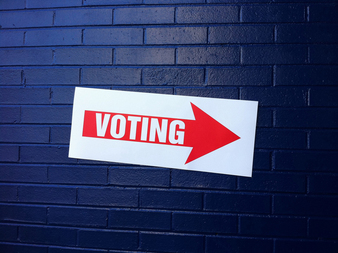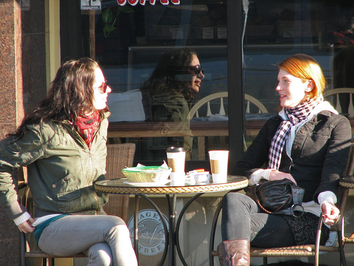 If you're a regular reader of HeartWood, you may have noticed I was absent last week. Like many people, I was absorbing the election results. And though I had written parts of this blog post before the election, I had to think about whether what I had written truly reflected my feelings. I concluded that it does.  Don't worry, I'm not going to get all political on you. I might do that in other settings, but that's not what this blog is for. Instead, I'd like to offer something to think about, post-election, no matter how you voted or how you feel about the outcome.  One point I think we all can agree on: the events of this election year haven't exactly promoted harmony and understanding among people with differing viewpoints. If anything, our divisions are deeper, our mistrust more pronounced, our fears more troubling.  So what now? Do we live with these bad feelings and allow them to fester? Or do we, who purportedly care about connection, goodwill and peaceful conflict resolution, do what we can to turn things in a more positive direction, while still working to further the causes we believe in? I cast my vote for the latter, and I have a suggestion to pass along for how to begin. I can't take credit for the idea. I read about it in a short piece published in O magazine in 2011. The article made such an impression on me, I saved it, and when I re-read it recently, I thought it even more relevant today than when it was written.  In the article, author Elizabeth Lesser wrote about "otherising," the distressing and dangerous practice of ordinary people demonizing other ordinary people simply because of differences in opinions, beliefs, or other traits. Like the recent presidential race, the 2008 election saw quite a lot of otherising, wrote Lesser. "And there was one woman doing it who bothered me the most—me! I'm a true believer in our capacity to care and cooperate, but there I was, participating in otherising rants, calling whole groups of people evil wrongdoers, though I had never talked to them." This from a woman who cofounded the Omega Institute and has written books about love, spirituality and transformation!  Does Lesser's admission strike a chord? Be honest, now. In recent months, have you found yourself making assumptions and negative remarks about people whose political views differ from yours? I'll be surprised if you say no—I'm sure we've all done some of that.
 An experience similar to my canvassing and calling encounters led Lesser to the "experiment" she wrote about in the O article. After lunching with an activist from an opposing camp and conversing cordially about family, jobs and larger concerns, Lesser began to deliberately seek out such meetings, if for no other reason than to "breed civility" in her own heart. She came up with a few ground rules for both parties to agree to (to which I've added a little of my own spin):
 You don't have to seek out strangers for these discussions; most of us have friends, neighbors and relatives who feel differently than we do about hot-button issues.  I'm not saying these conversations will be easy. It's much more comfortable to speak our minds when we're among people who nod and say, "Exactly!" But when I've dared to step outside that comfort zone and talk openly with friends and acquaintances who don't share my views, I've not only come to understand them better, I've had to think more deeply about my own opinions in order to articulate them. So what do you think about the idea of taking an Other to lunch? Is it naïve to believe it might lead to a little more understanding? Or is it worth a try?
8 Comments
Cindi
11/16/2016 06:49:51 am
What a timely piece. Sadly, the Other, that I need to take to lunch, lives thousands of miles away. I totally agree that talking, rationally, about one's political differences can be enlightening. Freedom of choice is one of God's greatest gifts. Don't belittle a person if he/she does not hold the same political beliefs as you. Find out why. Show respect.
Reply
Nan
11/30/2016 08:00:04 am
Good thoughts, Cindi. We may not see eye to eye on everything, but this is something we can agree on.
Reply
Emily Everett
11/16/2016 07:11:56 am
So glad for this blog! It's a topic that's been weighing on me, especially as I think about traveling 900 miles to spend Christmas with relatives who voted differently from me. In the past, our political conversations were not illuminating, just tense, and the gap between us is even wider this year. I would like for us to get beyond the rhetoric and speak to and from our hearts. How do we do that? I don't know. All I know is I need a lot of help with this and look forward to hearing from others.
Reply
Sally Pobojewski
11/16/2016 07:12:56 am
What a great and timely idea! I've been struggling with how to cope after this election. I've decided to speak up and/or intervene when I witness something hateful. But I'm going to try this, too. You are a wise woman, Nancy!
Reply
Tonya Howe
11/16/2016 12:30:37 pm
I like the ground rules, expecially the question: "what have you always wanted to ask someone from the other side?"
Reply
Outstanding article here, Nan. I wholeheartedly agree we should be able to talk civilly to one another. Instead, so many people don't want to listen, but rather to talk over those who disagree.I guess the person believes the louder he talks, the more people will agree with him. Sadly our children are watching adults act in such a shameless way. Not role models for them at all.
Reply
11/16/2016 08:30:24 pm
I am very lucky because my work as a journalist allows, no it forces, me to talk to people I don't agree with. I am talking quite often with a member of the Trump transition team, whom I consider a professional friend. But while I enjoy listening to him defend his positions, and explain to me while white nationalism isn't really that bad, I still cant get behind a Muslim registry or deporting millions of people, or gutting Medicare and Social Security. But we talk anyway.
Reply
11/18/2016 09:52:24 am
I had another idea on this "reach out to the other side" idea. I intend to ask my friends/family who are Trump supporter if, in the spirit, of unity, they will contact their senators or Trump organization and say they don't want to deport millions of Mexican Americans (who are our housecleaners, agricultural workers, etc), nor form a Muslim registry, which is unconstitutional. That would be reaching out to the other side and healing.. Sorry for being political. Its just who I am.
Reply
Leave a Reply. |
Written from the heart,
from the heart of the woods Read the introduction to HeartWood here.
Available now!Author
Nan Sanders Pokerwinski, a former journalist, writes memoir and personal essays, makes collages and likes to play outside. She lives in West Michigan with her husband, Ray. Archives
April 2022
Categories
All
|




 RSS Feed
RSS Feed